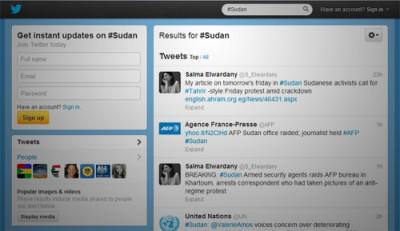
Social media provided a continuous flow of updates about the government’s crackdowns on peaceful demonstrators, news about detainees, and maps of the location of the scattered protests. Just as in Egypt, Tunisia, and now Syria, activists in Sudan are using these online tools not only to coordinate their own activities, but also in hopes of drawing the attention of the wider world.
Interestingly, despite the fact that Sudan is a very poor country with nearly half the population under the poverty line, 10 percent still had access to the Internet as of 2008. It is estimated that this proportion has doubled in the last four years, and the country may now have as many as 8 million regular Internet users.
And, as in Egypt and Tunisia, the protests in Sudan are primarily driven by economic concerns. When I last visited the country, I was shocked by the high prices: certain products were almost ten times the price of a year ago, and it is reported that the inflation rate is nearing 30 percent.
The roots of the current economic crisis lie with the secession of South Sudan in July 2011 and the Sudanese government’s attempts to deal with the fiscal impact. Sudan lost billions of dollars in oil receipts, with no economic alternative in sight. Prior to the South’s secession, 75 percent of GDP/government revenue was derived from oil and petroleum products, which also accounted for more than 85 percent of Khartoum’s export earnings.
In the late 1990s, before the signing of the Comprehensive Peace Agreement between the north and the south, Sudan built a huge pipeline to transport petroleum from oil fields in the south to Port Sudan on the Red Sea, the country’s sole export terminal. After the secession, both countries failed to agree on the compensation owed to Sudan for use of these pipelines by the South. In January, South Sudan announced that it would not pump a single drop of oil unless Khartoum accepts the proposed fees. A few months later, conflict erupted between the two countries.
Sudan’s options for external support are limited. Sudanese President Omar al-Bashir is under indictment by the International Criminal Court for alleged war crimes and crimes against humanity, which has resulted in US sanctions, and the country already has $38 billion in outstanding foreign debt.
With no alternative to plug the deficit, the Sudanese Parliament two weeks ago announced harsh austerity policies, increasing taxes on banks, eliminating subsidies on fuel, and increasing the sales tax to 17 percent, in addition to cutting the state budget, laying off civil servants, and restructuring the ministries.
Al-Bashir described the austerity measures as “the bitter remedy” and asked the people to understand and support these measures to overcome the crisis.
However, beginning on the day the austerity measures were announced, Sudanese citizens from various walks of life launched a massive movement against the government. Protests initiated by students at the University of Khartoum are now expanding all around the country to include most of the big cities. Last Friday, hundreds of protesters blocked the roads, burning tires and chanting slogans calling for the downfall of the regime and for democracy. Activists plan to continue the protests against the ruling National Congress Party today and on June 30, the 23rd anniversary of al-Bashir’s regime, which began with a coup in 1989.

